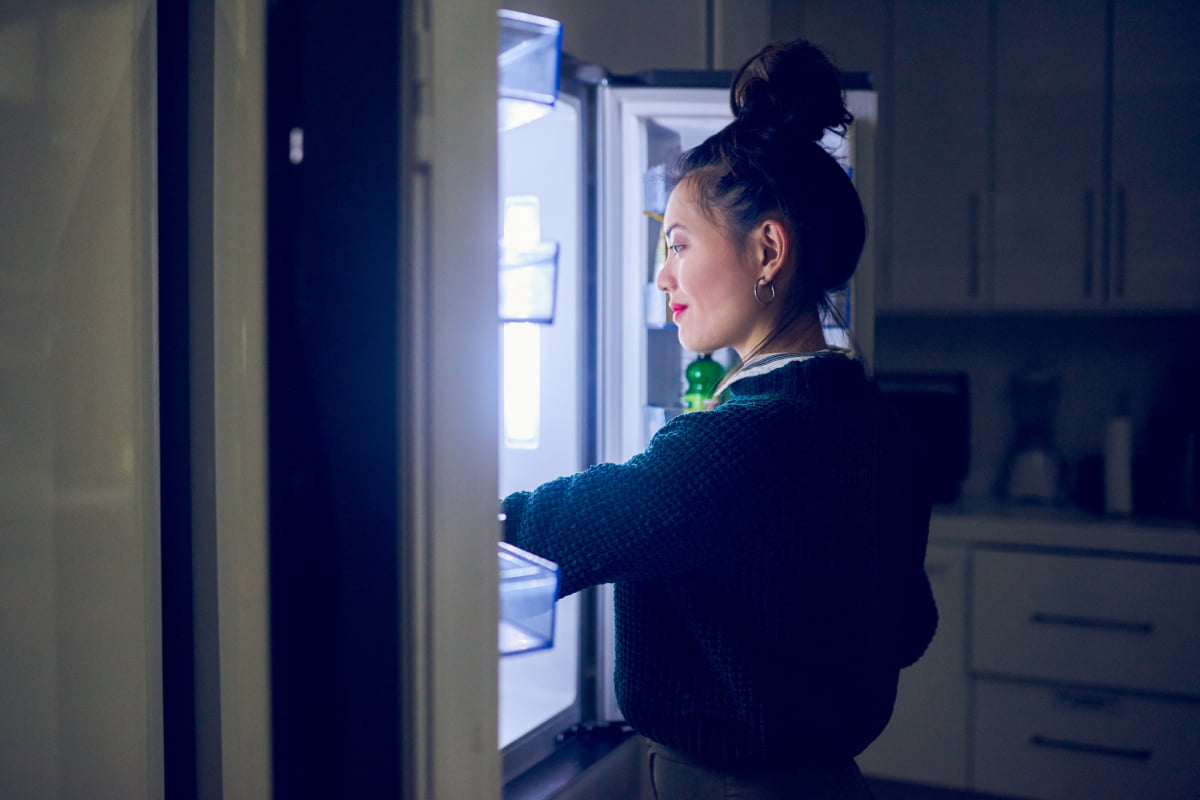Study Suggests that Late-Night Snacking Can Affect Your Skin

The damaging effects of UV radiation include sunburn, premature aging, dark spots, and even skin cancers. We all know that wearing sun-protective clothing and using sunscreen are some of the best ways to defend our skin, but a study suggests that your eating habits—particularly if you’re snacking late at night—may also have an effect on how well your skin is protected from UV damage. Here’s what you need to know.
How late-night eating disrupts your skin’s natural protection
A University of Texas study published in the journal Cell Reports looked at the effects of switching some mice’s natural eating pattern from night (they are nocturnal) to daytime. The researchers found that the disrupted eating habits resulted in greater vulnerability to UVB skin damage compared with that of the mice who ate at their normal feeding time.
The irregular eating pattern resulted in a change to the circadian rhythm of the mice’s skin, which led to a reduction in an important enzyme that helps to protect skin against UV damage. In the mice fed during the day, the enzyme became less active in the daytime and more active at night—the opposite of what it should be doing in these nocturnal animals.
Your skin’s natural ability to protect you from sun damage may be compromised by eating at the wrong time of day.
More research is needed to know if the same results would be seen in humans. Still, a researcher behind the study stated that these results are a good reason for us to avoid abnormal eating schedules (particularly eating at night), which could potentially shift our skin’s internal “clock.”
More reasons to avoid late-night snacking for healthy skin
Apart from the implications of the University of Texas study, you should also avoid late-night snacking because it can disrupt sleep, and disrupted sleep contributes to skin aging. A Cambridge University study on bedtime eating and drinking noted, “earlier timing of eating or drinking in relation to bedtime – between 4 and 6 h [before] – increases the likelihood of optimal sleep duration.” This means that, if your bedtime is 11:00 p.m., the ideal time for your last meal of the day is between 5:00 p.m. and 7:00 p.m.
To protect your skin, avoid the temptation of midnight snacks and try to eat your meals at regular times during the day.
Further, it’s common to crave unhealthy ‘junk’ food when snacking at night. Many popular American snack foods (particularly those that are sugary, fatty, or contain milk) are known to be associated with acne. A previous study has also found that ultra-processed foods are associated with faster aging.
And your skin isn’t the only part of your body affected by the timing of your meals: a study out of Japan found that dinner before bed and/or late-night snacking was linked to metabolic syndrome, dyslipidemia, and obesity. Late-night overeating is also associated with cardiovascular disease risk factors.
But how do I avoid late-night snacking?
To avoid the temptation of chips and ice cream at bedtime, it’s important to create new habits for yourself, starting with breakfast. Eat bigger meals during daylight hours, and have healthy snacks—such as fruit, veggies, or raw nuts—ready to eat in-between meals. When you do crave an evening snack, try substituting it with a calming ritual: do a series of gentle stretches, make yourself a cup of herbal tea, or listen to a guided meditation. If you must have a snack, choose something light and easily digestible, such as a piece of fruit.
Eating foods rich in healthy fiber, fat, and protein promote healthy skin and help to prevent late-night cravings.
Thankfully, many foods that are good for your skin and overall health, including fatty fish, avocados, nuts, and seeds, are also known for offering healthy fiber, fat, and protein—nutrients that can help to reduce snack cravings between meals. Avoid overconsumption of sugar and processed foods in your diet, which will do the opposite, increasing cravings. Lastly, be sure to drink plenty of water, as it is key for optimal health.
Support your skin health with Dr. Hess in Fairfax, VA
Board certified plastic surgeon Dr. Christopher L. Hess has been serving patients in the Fairfax, VA area for over 20 years and was named one of Northern Virginia Magazine’s Top Plastic Surgeons for 2010, 2011, 2012, 2013, 2014, 2015, 2016, 2021, and 2022.
Dr. Hess and our medical team offer a full range of skin treatments in addition to procedures for the breast and body. We would love to help you create a customized skin treatment plan to rejuvenate your appearance and achieve your aesthetic goals. Schedule your consultation with us online or call (703) 752-6608 to get started on your personal transformation.